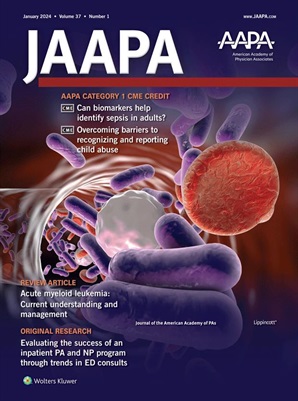
From topics on ankle arthroplasty, infectious diseases, the shoulder, sports-related concussions, reimbursement and more, all on demand. Physician Assistants in Orthopaedic Surgery (PAOS) on Demand 2023 is a collaboration between AAPA and Physician Assistants in Orthopaedic Surgery (PAOS).
Member: $399.00
Non-Member: $549.00
20.25 AAPA Category 1 CME credit

This case-based self-assessment activity outlines the evaluation and treatment of extremity injury, plus new clinical and technical skills to improve the delivery of healthcare to patients with upper and/or lower extremity trauma. This CME expires January 31, 2026, 11:59 PM EST. Physician Assistants in Orthopaedic Surgery (PAOS) Self-Assessment 2023 is a collaboration between AAPA and Physician Assistants in Orthopaedic Surgery (PAOS).
Member: $149.00
Non-Member: $249.00
5.00 AAPA Category 1 Self-Assessment CME credit

Can Biomarkers Help Identify Sepsis in Adults? | Overcoming Barriers to Recognizing and Reporting Child Abuse
Member: $0.00
Non-Member: $25.00
1.00 AAPA Category 1 CME credit

Explore the past, present, and exciting future of telemedicine, plus insights on coding and billing, and gain knowledge on best practices and skills for webside manner. Activities Telemedicine Coding, Billing, and Conducting | 0.75 AAPA Category 1 CME credit Learning Objectives Discuss the coding terms and principles relative to telemedicine Discuss the importance of accurate coding of telemedicine encounters Discuss setting up the environment for conducting a telemedicine encounter Telemedicine Past, Present, and Exciting Future | 0.75 AAPA Category 1 CME credit Learning Objectives Detail a historical review of telehealth in the United States Discuss current legislative issues and initiatives in telehealth Provide information on advocacy and future prospects for clinicians (especially PAs) in telemedicine Webside Manner: The Best Practices and Skills You Need to Know | 0.75 AAPA Category 1 CME credit Learning Objectives Review the basic settings of virtual care delivery: room selection, lighting, design, internet, electronics Discuss tips in setting the stage of the visit: Introductions and Summarizations Describe ways to establish and build patient rapport AAPA offers no returns or refunds for online CME activities purchased via the AAPA store. All sales are final.
Member: $35.00
Non-Member: $50.00
2.25 AAPA Category 1 CME credit

The nature and purpose of this activity is to discuss and review the benefits and risks associated with practicing behavioral health via telemedicine. Learning Objectives At the conclusion of this activity, participants should be able to: Explain how telemedicine improves access to Behavioral Health services Demonstrate what should be asked about when taking history Describe what to look for on the exam Identify what limitations there are to telepsychiatry Accurately answer PANCE-style questions while using appropriate screening tools for behavioral health conditions
Member: $15.00
Non-Member: $20.00
1.00 AAPA Category 1 CME credit

As a clinician, do you want to understand where to start when coding, billing, and best practices for conducting a telehealth encounter? This activity brings you up to date (as of October 2022) on coding and billing practices for virtual care It includes
Member: $15.00
Non-Member: $20.00
0.75 AAPA Category 1 CME credit

Telemedicine has been a care delivery model that has evolved over several years and what has been done to lead up to the adoption of today’s telehealth infrastructure deserves to be recognized. This activity explains the journey for the healthcare industry from an idea and vision to what became the wide and fast-paced adoption of telehealth during the COVID-19 pandemic. So much still needs to be done and the industry and our patients need the clinician’s help. After learning in what context and influence clinicians can have in the continued promotion of care delivery models that incorporate telehealth, a clinician will be able to speak more informed to stakeholders and decision makers who need our help to continue to pave a path for telehealth. This content was created and most up-to-date as of October 2022. It is important to recognize it will not include information about telehealth after October 2022 and we suggest clinicians continue to watch for updates on telehealth. Learning Objectives At the conclusion of this activity, participants should be able to: Detail a historical review of telehealth in the United States Discuss current legislative issues and initiatives in telehealth Provide information on advocacy and future prospects for clinicians (especially PAs) in telemedicine AAPA offers no returns or refunds for online CME activities purchased via the AAPA store. All sales are final.
Member: $15.00
Non-Member: $20.00
0.75 AAPA Category 1 CME credit

Telehealth and virtual care came at a time of desperate need during the COVID-19 pandemic. Clinicians were able to get reimbursed for providing medical care to patients virtually but often onboarding for this progressive care delivery was lacking in how to deliver the best virtual visit in regard to the environment, modifications to in-person care, and pre-visit/post-visit experience for patients. With this activity, learn important details that optimize the “virtual visit” including tips and tricks, technology hacks, and ways to develop a stronger rapport between a patient and clinician through telehealth. AAPA offers no returns or refunds for online CME activities purchased via the AAPA store. All sales are final. Learning Objectives At the conclusion of this activity, participants should be able to: Review the basic settings of virtual care delivery: room selection, lighting, design, internet, electronics Discuss tips in setting the stage for the visit: introductions and summarizations Describe ways to establish and build patient rapport
Member: $15.00
Non-Member: $20.00
0.75 AAPA Category 1 CME credit

Evidence-based courses to equip healthcare and wellness providers with the knowledge and resources to help people reduce the risk of dementia and Alzheimer's.Evidence-based courses to equip healthcare and wellness providers with the knowledge and resources to help people reduce the risk of dementia anEvidence-based courses to equip healthcare and wellness providers with the knowledge and resources to help people reduce the risk of dementia and Alzheimer's.
Member: $75.00
Non-Member: $100.00
6.00 AAPA Category 1 CME credit

Hypertension is one of the most important known modifiable risk factors for dementia. Managing blood pressure can reduce the risk of cognitive decline. This course provides actionable guidance and tools to help health professionals effectively address this opportunity with patients and families.
Member: $15.00
Non-Member: $20.00
1.00 AAPA Category 1 CME credit